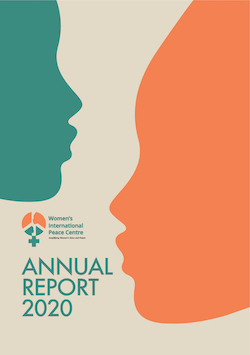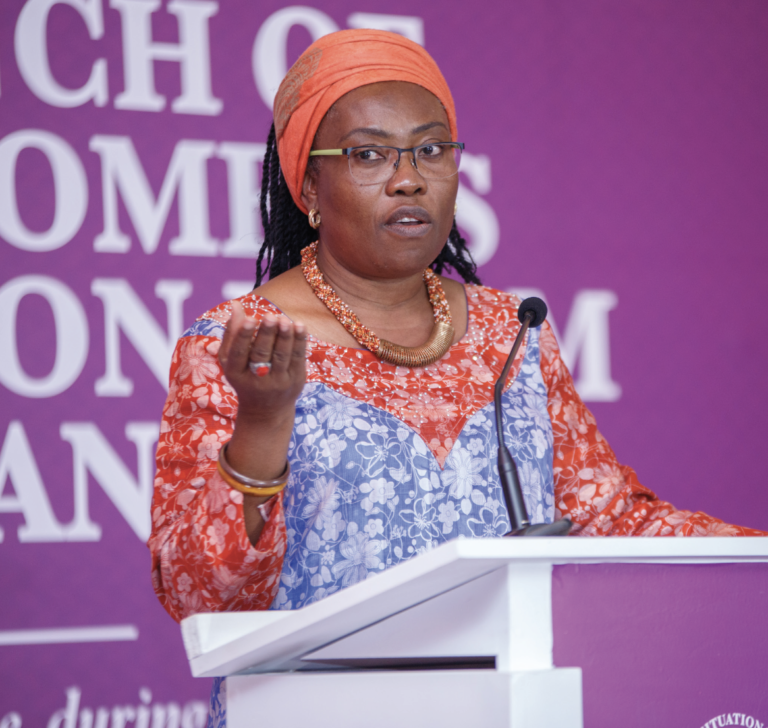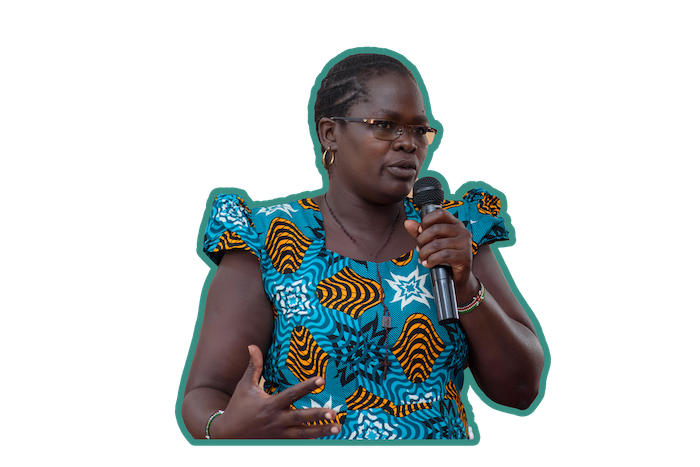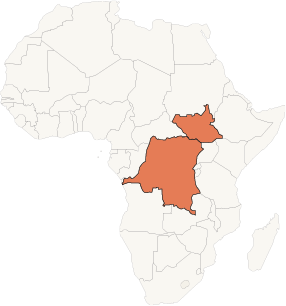
The Peace Centre
ANNUAL
REPORT
2020
Message from the Executive Director
Helen Kezie-Nwoha
2020 was a pivotal year for gender equality. We marked 25 years of the ambitious Beijing Declaration and Platform for Action, and 20 years of the landmark UN Security Council Resolution 1325 on Women, Peace and Security (WPS).
The year presented an important opportunity to evaluate progress in advancing the WPS agenda and for all actors to recommit to delivering on unfulfilled commitments to women affected by conflict. 2020, however, also marked the outbreak of the COVID-19 pandemic, a crisis that worsened existing gender inequalities and affected WPS progress.
To continue promoting women’s participation in peace processes, we adapted the design of our projects and used alternative means to meet the same goal. We organized more online meetings, cut down on meeting size, include protective gear such as masks and sanitizer as essential materials for all activities and our staff continued working from home, accessing the office in shifts as needed.
In promoting the holistic wellbeing of women we provided women peace mediators in the host and refugee communities in Uganda with sanitary kits to ensure they can safely raise awareness on peace and COVID-19 prevention within their communities. We also developed a practical wellness guide that supported women human rights defenders to enhance their wellbeing and sustain their productivity and activism both during and after the peak of COVID-19.
We are grateful to the Peace Centre staff, Board members and partners for your continued support to our work and our vision of a world where women live in peace and re(create) peace.
Sincerely,

SUMMARY OF OUR 2020 IMPACT
01
ENHANCED TECHNICAL EXPERTISE OF WOMEN TO PARTICIPATE IN PEACE PROCESSES


Democratic Republic of Congo
In DRC, 22 women leaders trained on feminist transformative leadership and advocacy for UNSCR 1325 mitigated local conflicts and successfully advocated for the nomination of more women (including 10 young women) into the leadership structures of political parties. Through radio, posters and 32 dialogues in schools, universities and communities, the trained women along with partners KJN and AFEM encouraged protection from COVID-19 and denounced increased gender-based violence during
22
22 women leaders trained on feminist transformative leadership and advocacy for UNSCR 1325 mitigated local conflicts
32
32 dialogues in schools, universities and communities, the trained women along with partners KJN and AFEM encouraged protection from COVID-19 and denounced increased gender-based violence

Nepal
In Nepal, working with National Women Human Rights/Defenders Tarangini Foundation, the transformational leadership of 251 women was strengthened to deliver on peace dividends for women. We skilled 215 Parliamentarians, Deputy Mayors, Vice Chairpersons and WHRDs to integrate women’s priorities in provincial budgets and plans. 136 women leaders including legislators, journalists, counsellors and COVID-19 frontline workers jointly reflected on the impact of COVID19 and planned their support to affected women.
251
The transformational leadership of 251 women was strengthened to deliver on peace dividends for women
215
We skilled 215 Parliamentarians, Deputy Mayors, Vice Chairpersons and WHRDs to integrate women’s priorities in provincial budgets and plans
136
136 women leaders including legislators, journalists, counsellors and COVID-19 frontline workers jointly reflected on the impact of COVID19 and planned their support to affected women

South Sudan
In South Sudan, with the Ministry of Gender, Child and Social Welfare 60 Gender Focal Persons from government ministries and commissions were trained to understand, implement and report on the UNSCR 1325 National Action Plan, contributing to the country’s 2020 report. 21 young women trained to influence and participate in implementing the revitalised peace agreement raised awareness on the gender provisions in 2 Protection of Civilian camps and linked displaced women to national women’s rights organisations calling for women’s participation.
60
60 Gender Focal Persons from government ministries and commissions were trained to understand, implement and report on the UNSCR 1325 National Action Plan, contributing to the country’s 2020 report
21
21 young women trained to influence and participate in implementing the revitalised peace agreement raised awareness on the gender provisions in 2 Protection of Civilian camps and linked displaced women to national women’s rights organisations calling for women’s participation.

Uganda
In Uganda, 235 women peace builders in refugee and cross-border communities in 6 districts were trained on mediation and advocacy on UNSCR 1325. 137 women and men as well as 123 peace committee members were trained as conflict monitors and analysts. They handled 373 conflict cases and worked with district peace committees and the national conflict early warning and early response mechanism to provide regular information for response. Working with the Ministry of Internal affairs led to re-functionalizing of 6 District Peace Committees and the National Steering Committee.
235
235 women peace builders in refugee and cross-border communities in 6 districts were trained on mediation and advocacy on UNSCR 1325.
137
137 women and men as well as 123 peace committee members were trained as conflict monitors and analysts.
373
They handled 373 conflict cases and worked with district peace committees and the national conflict early warning and early response mechanism to provide regular information for response.
02
2020 IMPACT
INFORMATION IS AVAILABLE FOR WOMEN TO INFLUENCE DECISION-MAKING IN PEACE PROCESSES
In 2020 we conducted 7 research studies, with our partners, focused on South Sudan, Uganda, the Great Lakes region and globally to support the influencing work of women’s rights organisation on peace and security.
In South Sudan we2 mapped women’s rights organisations working on women, peace and security (WPS), presenting these findings to representatives of the UK government and international community who committed to support CSOs advancing the WPS agenda.
In Uganda, with Womankind Worldwide and GAPS we studied the impact of COVID-19 on gender equality, peace and security, using the results to engage the UK government on the international response to COVID-19, future crises and WPS commitments. With Uganda’s National Transitional Justice Policy in place, we documented citizens’ views and recommendations for implementation, engaging government ministries, parliamentarians, civil society and the public to advocate for citizens’ priorities.
To better understand support women’s collective organising against GBV and for peace building, we partnered with the Global Fund for Women to study the Peace Building and Ending Gender-Based Violence Movement in the Great Lakes, focused on DRC, South Sudan, Burundi and at regional level.
Research conducted with Cordaid studied the shrinking spaces for women’s organisatons and peace builders to influence regional and global policymaking platforms on WPS, informed by women from Libya, Cameroon, Togo, Nepal, DRC, South Sudan, CAR, Senegal, Guinea Bissau, Sierra Leone, Somalia and Yemen. The findings were used to engage the AU Peace and Security department and Office of the WPS Envoy.

03
2020 IMPACT
INFORMATION IS AVAILABLE FOR WOMEN TO INFLUENCE DECISION-MAKING IN PEACE PROCESSES
100 refugee women peace builders in Uganda advanced their participation in the South Sudan peace process, engaging South Sudan CSOs on the priorities and presenting their recommendations to governments of South Sudan, Uganda, the Troika and UN agencies in Uganda.
We ensured diverse women peace builders and women’s rights organisations participate in and influenced regional and global processes including
The 35th and 36th Civil Society Pre-Summit Consultative Meeting on Gender Mainstreaming in the African Union and Member States where refugee women, DRC and Burundi partners engaged IGAD and AU WPS Special Envoy on implementation of WPS national action plans and influenced recommendations for the revision of the Master Roadmap of Practical Steps To Silence The Guns of the AU Peace and Security Council
The AU Specialised Technical Committee on Gender Equality and Women’s Empowerment Meeting on the Impact of COVID-19 on Gender Equality and the AU Gender Ministers’ Meeting on Mainstreaming Gender in COVID-19 Response where we shared lessons from work with refugee women and later joined GIMAC network to present a Statement to African Union Member States on the Impact of COVID-19 on Women and Girls.
The East African regional CSO Consultation on WPS we co-hosted with the African Union Peace and Security Department to inform the Advisory Opinion to Member States, RECs and the AU organs on actions to accelerate implementation of the WPS agenda.
Influencing the future of the Grand Bargain beyond 2021 in relation to gender equality along with the Grand Bargain Friends of Gender Group, calling for the Safety of Women and Girls during COVID-19 in Humanitarian Response and accountability for the (under) fulfilment of commitments made at the Oslo conference on Ending Sexual and Gender- Based Violence in Humanitarian Crises.
The Peace Centre joined the governance structure of the Women, Peace and Security- Humanitarian Action Compact (an outcome of the Generation Equality Forum) as a Catalytic Member, joining Member States, regional bodies, UN agencies, civil society networks, and private sector entities to steer the design and implementation of the WPS-HA compact’s commitments.
04
2020 IMPACT
HOLISTIC WELLBEING OF WOMEN IN PEACE PROCESSES ENABLED
With COVID-19 putting additional pressure on women peace builders’ wellbeing and the wider women’s movement, the need for tailored support was clear. The Peace Centre developed Healing through Rituals: a Guide for Sustaining Wellness and Activism and hosted wellness sessions for 568 women human rights defenders in Nepal, D.R.C, South Sudan and Uganda. Through the Self Love Camp, heads of women’s rights organisations learned how to mainstream feminist leadership and wellness. In 2020 we equipped women for personal and organisational healing as well as creating healing communities.
